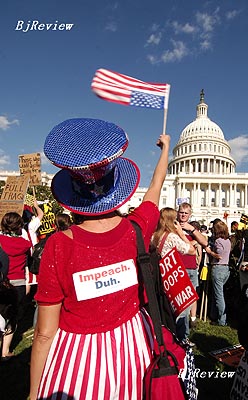|

Four and a half years after the United States invaded Iraq, President George W. Bush has decided to start withdrawing troops from the country. Although the total number of soldiers to be withdrawn by next summer is not large - approximately 30,000 of the current 168,000 - foreign affairs experts said Bush's decision is an attempt to improve the standing of the Republican Party at home prior to the 2008 presidential election in spite of Americans' continued opposition to the war.
Yet, the troop withdrawal will not influence what happens in Iraq, experts said. The country's main mission is to reunite all its political and religious groups to build stability and prosperity.
The situation in Iraq keeps getting tougher for the Americans. The number of American casualties continues to grow, antiwar protests have become more frequent, and the Republicans' hope of winning the 2008 presidential election is dim. And with Democrats in the majority in Congress, support for Bush's policy has diminished compared to what it was before the midterm congressional elections in 2006.
In early January 2007, Bush announced his intention to send more troops Iraq to boost security there in light of the continued attacks on American troops and Iraqi citizens. U.S. Congress set 18 benchmarks in its War Funding Bill passed on May 24, which covered political, economic and security aspects. These benchmarks set standards for measuring the progress made by additional forces. The Bush Administration submitted its first Iraq report to the government in July and a second one on September 14. But, according to both reports, the 18 benchmarks were not met.
On September 9-10, General David Petraeus, the commander of the U.S. forces in Iraq, and Ryan Crocker, the U.S. Ambassador to Iraq, testified before Congress about the security situation there after the additional troops were sent. According to Xinhua News Agency reports, Petraeus made three main points. First, the U.S. Government's reinforcement had made some achievements in Iraq, and large amounts of U.S. troops should not be cut off. Second, although Iraq's Central Government made little progress, the situation of local governments in the country had improved. Third, a sudden withdraw would lead to disaster in Iraq.
A poll by Cable News Network (CNN) showed that about 53 percent of the American public did not believe the current situation in Iraq was just like Petraeus had said, according to a Xinhua News Agency report.
On September 13, Bush announced a plan to withdraw some troops by next summer. In his address to the nation, Bush used the expression "bring some of our troops home" rather than "withdraw," and said the plan was based on the principle of "return on success," meaning that the more successful the United States was in stabilizing Iraq, the more American troops would be withdrawn.
Under the current plan, 2,200 Marines will return immediately and will not be replaced. An Army brigade of 3,500 will be sent home by Christmas. Approximately 23,000 troops are scheduled to return by next summer, leaving about 139,300 U.S. troops in Iraq.
Politics at home
Zhang Guoqing, an American studies researcher at the Chinese Academy of Social Sciences (CASS), cited several reasons for Bush's decision to start the troop pullout. First, it resulted from wrestling between Congress and the White House. With the Democrats now controlling Congress and strongly urging the government to withdraw troops from Iraq, the White House and U.S. Congress are in a teeter-totter situation where they must compromise on certain occasions regarding Iraq. If the Bush administration maintains a hardline attitude on Iraq, it might face more pressure from Congress on other issues, especially on domestic affairs.
"The partial pullout plan can get the government more support from Congress on other affairs, such as [Bush's] war funding application," Zhang said.
Second, Bush based his decision on trying to boost the position of the Republican Party for the coming presidential election. Antiwar voices have grown louder inside the United States due to the Democrats' position on troop withdrawal after they won the midterm elections last year. Democratic presidential candidates are in the lead because they favor pulling soldiers out of Iraq. By initiating a partial withdrawal, Bush is trying to get Republican presidential candidates more scores.
| 